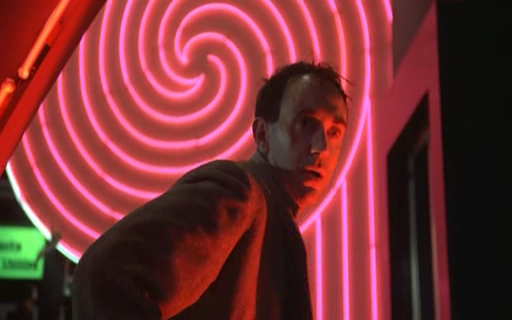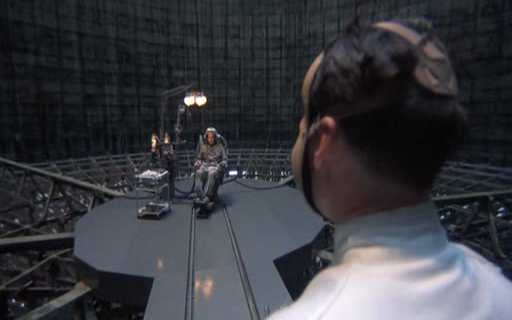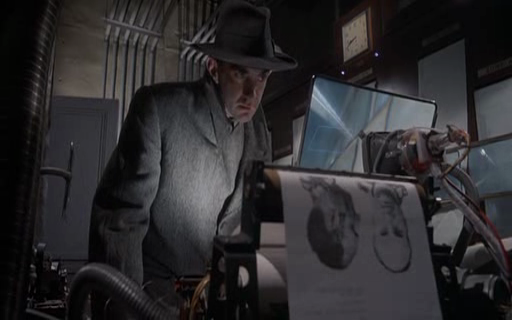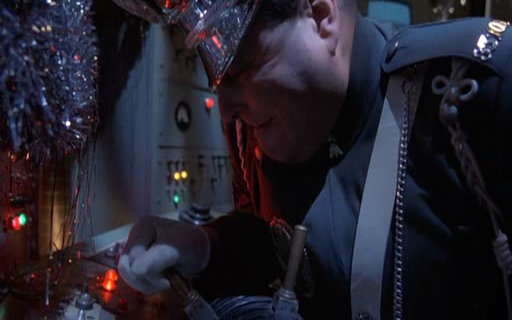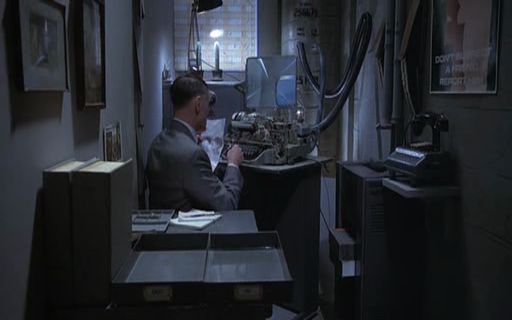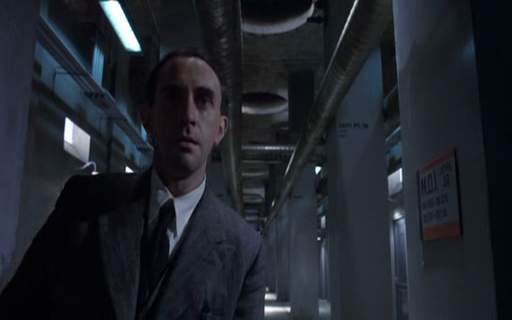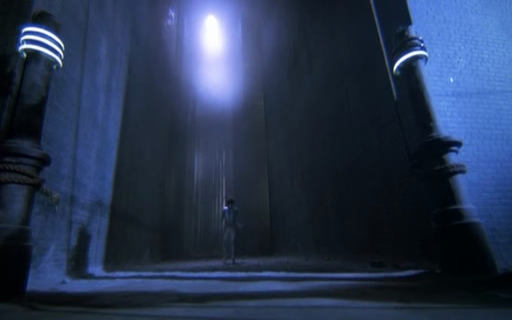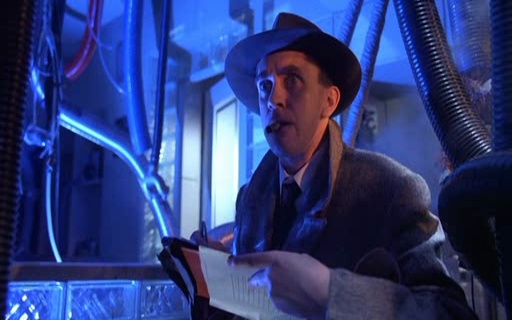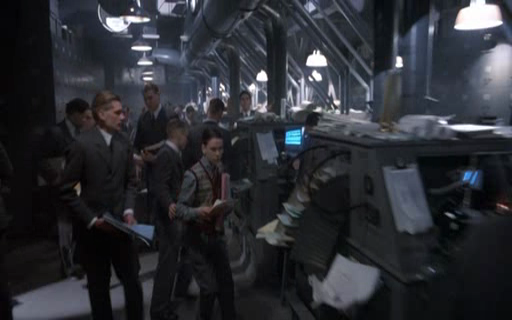-
#16 – Brazil (1985)
Brazil (1985)
Film review #16
Director: Terry Gilliam
A science-fiction film where information is king…
In an unidentified country, a man named Sam Lowry often find himself dreaming about saving a beautiful woman. In reality however, he is a low-level government employee at the ministry of records. Information and paperwork rules society here, and mistakes are unheard of. However, Sam is given the task of rectifying a mistake that caused Archibald Buttle instead of Archibald Tuttle to be arrested and (accidentally) killed.
Sam goes to deliver a reimbursement cheque to the widowed Mrs Buttle, since any cost of arrest and detainment are met by the perpetrator. She is however, stricken with grief, and refuses to fill out the paperwork. Sam then sees the woman living upstairs and recognises her as the woman from his dreams, he gives chase and loses her, but learns her name: Jill Lawton. However, he cannot access her records because she is considered a suspect for trying to report the mistake of Buttle’s arrest to a government that does not admit to making mistakes. When he returns home, he meets the real Tuttle, who helps to fix his air conditioning when it fails and Central Services (the company that handles all the repairs) is short-staffed. Tuttle is a renegade repairman who fixes things without the assistance of Central Services, which is highly illegal.
Sam figures the only way to get access to Jill’s records and her location is to accept his Mother’s help to get promoted to the Ministry of information retrieval. He goes to see her while she is in the midst of more plastic surgery. When he arrives at his new office at the ministry, he retrieves the records and tracks her down before she is arrested, after declaring he is in love with her, he erases her records to classify her as deceased. After sharing a romantic night with her, Sam is arrested.
Sam is tied to a chair ready for interrogation for misusing his government position. His old friend Jack is carrying out the interrogation, where he tells Sam Jill was killed resisting arrest. Suddenly, Tuttle and the resistance rappel in from the roof and free him. They break out of the ministry and go on the run, where Tuttle seems to disappear in a flurry of paperwork. Sam then stumbles upon the funeral of his Mother’s friend who has died from excessive plastic surgery. Sam’s mother now looks younger than him thanks to the plastic surgery, and Sam escapes in horror, and is rescued by Jill in her truck, and the two drive off into the sunset. This happy ending turns out to be short-lived however, when the scene cuts back to the interrogation room, where Sam has gone catatonic from the interrogation, and the film ends with him humming “Brazil” as Jack and the information minister exit the room…
Brazil is a very British film, featuring an almost entirely British cast. The ministries and locations are reminiscent of something you would find in Britain rather than the US for example. The humour lends itself to become a black comedy, similar to other British films such as Monty Python or Time Bandits (Also produced by Terry Gilliam). This comedic element is a very fresh take on the science-fiction genre, since the two are rarely combined. The dystopic nature of the film too is also a different take on future society which is favoured by Britain over the utopian views of the US, as shown by British TV shows such as Doctor Who.
The direction and design are reminiscent of other films and future views. For example, the retro-fitted design of the city filled with neon lighting and tightly packed rooms filled with electronics is similar to Blade Runner, while the concept of government being flawless and all knowledgeable is similar to George Orwell’s 1984. It should be noted that While Blade Runner was meant to represent a near future (2020), Brazil is very much a reflection on the (then) present day government. In this respect, it relates to how 1984 was written about a futuristic 1984, but Gilliam notes it is a “Nineteen-Eighty Four for 1984”, seemingly eager to emphasise its relevance to contemporary society. Unlike 1984 though, it lacks any sort of “Big brother” figure who ultimately watches and rules society. the architecture itself seems to be somewhat similar to the movie Metropolis as well. The dream sequences in Brazil also have a similarity to the dream sequences in Blade Runner. Neither film really explains the dreams, but perhaps they show the desire for people to break out of the regimented control of society. The suits, hats and waistcoats wore by the workers gives the movie a 40’s “noir” feel too, and makes the film feel like a 1940’s vision of 1985, with some things the same, but some things quite different. This again gives the movie a strange uncertainty about its location in time. As we look back on movies from the past with a “comical aesthetic” and find the sets and props rather humours in their inaccuracy, it could be concluded that this is what Gilliam intentionally wanted for Brazil, which fits the black comedy nature of the script nicely.
As Brazil is perhaps more of a present day take on society than 1984 or Blade Runner (As the beginning of the film says it takes place “sometime in the 20th century), we do not really see futuristic technology on display, but we see a different way of utilising technology than we do now. For example, the telephones look like telephones, but seem to have a completely different way of working than how we would normally use them. The same goes with computers, which look like a typewriter with a strange transparent screen, although many people did not have personal computers in 1985, they did not look look like what they do in the film. The duct-pipes have a very distinctive style, with these long inflatable pipes running through every location. When we see the inside of the air conditioning of Sam’s apartment, we see a mess of ducts and pipes that is carefully hidden behind these large metal plates. I can’t help but think this is a commentary of how society and governments likes to hide all the inconvenient mess behind clean, shiny coverings…except in the working-class homes, the ducts have not tried to be hidden, but seem to snake around the homes and obstruct the people that live there.
Brazil was not much of a success at the box office (The US box office especially), probably due to its unhappy ending, and coming in at nearly two and a half hours. Despite this, it has been recognised as a “cult film” and is highly regarded by critics, regularly appearing in top 10 lists for best science-fiction, British or cult films, and seems to have had an influence in the development of films, for example the apartment of Max Cohen in the movie Pi was inspired by this movie. I personally think it s definitely worth a watch when you have a two and a half hours, as it is a good mixture of social commentary, science-fiction and black humour, which is really enjoyable.

